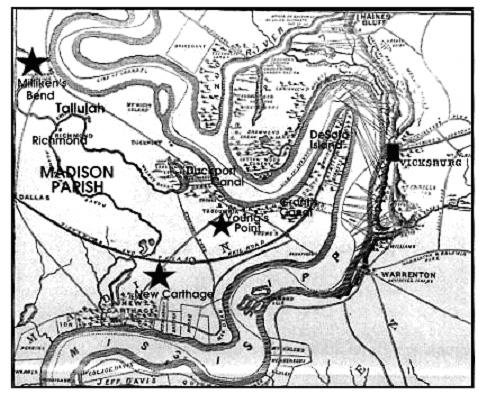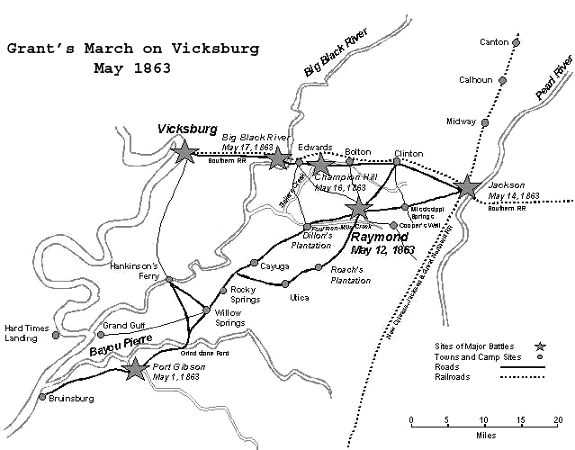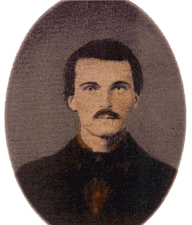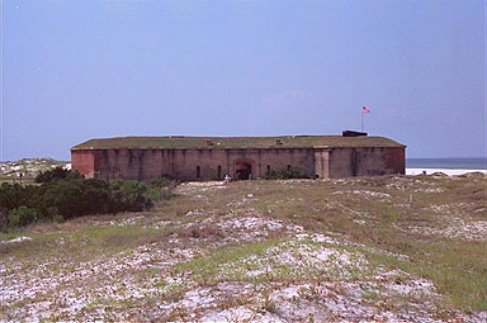 |
|
|
Great Granddaughter of Elijah Thomas
|
|
 |
|
| published in The South Fork Country News, Owsley County, KY | |
 |
|
|
Great Granddaughter of Elijah Thomas
|
|
 |
|
| published in The South Fork Country News, Owsley County, KY | |
Joseph Thomas was the son of Marchant Thomas and Jemima Hamilton, one of the first pioneer families of Clay County, KY, arriving there c.1808. Joseph and his wife, Anna Jemima Couch, had at least 14 children, about 6 boys and 8 girls. They were living on the farm on White Oak Creek, Owsley County when the Civil War broke out. At least four of their sons joined the Union Army.
The twins, Levi and Eli, enlisted just a few months shy of their 21st birthdays, on August 19, 1861 - only four months after President Lincoln's call for volunteers. They were single and still living at home when they were mustered-in to Co. D of the 7th KY Infantry, on September 22, 1861. The regiment was at once ordered to Wild Cat Mountain in Laurel County to resist the advance of the Confederate soldiers under General Felix Zollicoffer. An outbreak of measles hit the camp in October that year and the sick were quartered in an old house until they could be sent to the hospital in Mt Vernon, KY. Eli was among those stricken. Joseph and Anna visited him while he was sick and were eventually able to get a furlough for him to come home. His condition never improved and five months after the onset of the disease, on March 20, 1862, Eli died at home from complications of the measles.
Camp diseases were rampant, especially among rural recruits. They were crowded together for the first time with large numbers of individuals and got diseases they had no immunity to. This came at a time before doctors knew much about bacteriology and were ignorant of what caused diseases. Childhood diseases like measles and mumps became epidemic problems. For every soldier who died in battle, two died of disease.
Eli's twin brother, Levi, continued to serve another 2½ years.
Levi was 5 feet 7½ inches tall, had light hair and blue eyes. After the battle at Camp Wild Cat, his regiment stayed in that area for the winter and then in the Spring of 1862, it was placed in General S. P. Carter's brigade of General George W. Morgan's division. This division made an expedition to Cumberland Gap, capturing the place June 18, 1862. General Morgan held Cumberland Gap until the invasion of Kentucky in September, 1862. Regarding that invasion, the following excerpt is from the sketches written by Captain Thomas L. Speed in the book The Union Regiments of Kentucky, published in 1897.
In that month the Confederates were invading Kentucky in great force from three directions. General Bragg, by way of Glasgow; Kirby Smith through the mountains by way of Barbourville, and Humphrey Marshall out of Virginia, toward Mount Sterling. In such conditions General George Morgan's escape seemed impossible. Kirby Smith sent a demand for his surrender, and General Stevenson went against him with a force of four brigades. General Morgan described his situation thus: "Stevenson in rear, Bragg to the left and Humphrey Marshall to the right. The only thing to do was to abandon the Gap and strike for the Ohio at the nearest point." September 16th, the march commenced. The retreat was across Kentucky, by way of Manchester, Booneville and West Liberty to Greenupsburg, on the Ohio. The season was dry and water scarce. The country was full of Confederate forces and frequent skirmishes took place. In one instance, a road had to be cut for four miles [to allow for escape].
Safely crossing Kentucky River at Proctor, eluding Marshall at West Liberty, feigning toward Maysville, and pushing for Greenupsburg, General George Morgan reached the Ohio "without the loss of a gun or a wagon, and with the loss of but eighty men" as he states himself.
Upon arriving at the Ohio River, the troops of General Morgan, [including the Seventh Kentucky] rested a short time, having crossed to the Ohio side at Oak Hill. They were then ordered to West Virginia, to General J.D. Cox, in the Kanawha Valley. Remaining there a short time, they were ordered south to join the forces under General Sherman, then advancing upon Vicksburg. In the late fall of 1862, they proceeded by river transport by way of Memphis, and reached their destination. With this expedition of General Sherman were three Kentucky regiments, 7th, 19th and 22nd. All these participated in the celebrated assault at Chickasaw Bluffs, December 29, 1862, which was a failure, and great loss was incurred.
These regiments remained with the forces under General Sherman, and also when General Grant took charge of the Vicksburg expedition, until the surrender July 4, 1863.
While in Memphis, TN (Nov 10 - Dec 20, 1862), Levi began to have bouts of chronic diarrhea, making the events of the next several months even more grueling. His regiment joined the 2nd Brigade of the 3rd Division, of Major General Sherman's Yazoo [River] Expedition in Mississippi. They boarded transports at Memphis, TN and headed downriver toward Vicksburg. They arrived at Milliken's Bend, Louisiana, just above Vicksburg on Christmas Eve and tied up for the night. They moved up the Yazoo River, came ashore on December 26-27, and advanced cautiously inland. The challenges they faced are expressed in the following words taken from Vicksburg Campaign and Siege: December 1862-July 1863 by Terrence J. Winschel.
The field of battle fronted the Walnut Hills north of the city. Along the base of the hills the Confederates had established a formidable defense line, which, throughout most of its length, was shielded by water barriers. The most formidable of these was Chickasaw Bayou, a sluggish, tree-choked stream approximately fifty yards wide and chest-deep which ran across most of the Union front before turning sharply to the north…. The Confederates had also felled large numbers of trees in front of their works which formed a dense abatis [a defensive obstacle formed by felled trees with sharpened branches facing the enemy ] to obstruct the Union advance. Although the Confederates were greatly outnumbered, their fortifications proved strong, and reinforcements were on the way from north Mississippi….
Sherman launched his main attack on December 29. At 7:30 a.m. Union artillery roared into action. Confederate guns responded and for several hours an artillery duel raged but did little damage. At 11:00 a.m. Union officers deployed their troops in line of battle. Before them was a formidable task, and the chances of success were slim. Sherman said, "We will lose 5,000 men before we take Vicksburg, and may as well lose them here as anywhere else." [The battle cost Sherman 1,176 men killed, wounded, or missing.]
Levi survived the battle at Chickasaw Bayou and marched with Sherman's troops as they traveled northeast and crossed the Mississippi River into Arkansas. They joined forces with Rear Admiral David Porter's navy expedition in the attack and capture of Fort Hindman at the Post by the Arkansas River in January 1863, thus gaining control of the Arkansas River. The 7th KY Regiment was then assigned to the 2nd Brigade of the 9th Division, 13th Army Corps, Army of the Tennessee. It moved to Young's Point, LA where General Sherman's superior officer, Lieutenant General Grant, was attempting to build canals to reroute the Mississippi River away from the town of Vicksburg. In the early spring, flood waters inundated the area between Pointe Clear and New Carthage and in the flood-plagued camps, thousands of soldiers fell victim to dysentery, diarrhea, typhoid, malaria, and various fevers. The troops were moved to Millikens Bend March 9th and carried out maneuvers from there in March and April through the swamps to New Carthage.

On May 7th, the 2nd Brigade under General Sherman joined General Grant's march on the rear of Vicksburg. The 7th KY Infantry fought in battles, May 12-16, 1863, at Raymond, Jackson, and the decisive battle at Champion's Hill. According to General Grant, en route to Jackson, on the night of the 13th and into the day of the 14th, "it rained in torrents. The roads were intolerable, and in some places on Sherman's line, where the land was low, they were covered more than a foot deep with water, but the troops never murmured." [Personal Memoirs of U.S. Grant, Vol II, 1885-86. From: battleofchampionhill.org/gmarch]
The 7th's involvement in the battle at Champion's Hill is related by John Lucas, Lieut. Col., commanding officer of the 7th KY Infantry:
On the morning of the 16th of May, 1863, being in command of the Seventh Regiment Kentucky Volunteer Infantry, I was ordered to move forward with said regiment to the front of the First Brigade, which was then on the road leading from Raymond, Miss., to Edwards Depot, on the Vicksburg and Jackson Railroad, about ----- miles from Raymond. In obedience to said order, I advanced with my regiment as prescribed, preceded by one company of the Third Illinois Cavalry, and throwing forward a few vedettes and Companies A and F, of my regiment, as skirmishers, advanced about 2 miles, where the cavalry finding the enemy's pickets, we halted, and after a short reconnaissance resumed the advance, and proceeded about 1½ miles farther on said road, where we found the enemy in force. My regiment took position on the right of said road, first throwing Companies A, F, and D forward as skirmishers, and afterward the remainder of the regiment moved forward, and, driving the enemy's skirmishers from their position, the regiment was ordered by General Garrard to fall back and resume its original position in line of battle. Sending forward Company G as picket, remained in position until -- o'clock, when I was ordered with my regiment to advance with the brigade, and engaged the enemy, and after a short and very severe engagement, was ordered to fall back a short distance, and were not engaged any more during the day, as the enemy commenced a precipitate retreat to Black River Bridge.
On the evening of the 16th, we proceeded to Edwards Depot, where we halted for the night (having followed in rear of General Benton's brigade)…
On the morning of the 17th May, 1863, we resumed the pursuit to near Black River Bridge; took position on the left of the brigade. I then sent Companies A and B forward as skirmishers, and advanced upon the enemy's right, where they were strongly intrenched. My regiment was on the extreme left of the First Brigade, and advanced over an extensive open plain for nearly 1 mile. This plain is intercepted by a slough, which is about 500 or 600 yards from the enemy's works. My regiment entered the intrenchments about 150 yards to the left of the enemy's artillery, without opposition. The intrenchments are located below and near Black River Bridge, running nearly north and south.
The loss of my regiment in the actions of Champion's Hill and Black River Bridge is as follows: CHAMPION'S HILL. Killed: Commissioned officers 1 Enlisted men 2 Wounded: Enlisted men 14 Missing: Enlisted men 5 Total loss 22 Died since of wounds 2. No loss at Black River Bridge whatever. - [Official record of Lieut. Col. John Lucas, from: battleofchampionhill.org]
The Army of the Tennessee crossed the Big Black River on the night of May 17th and closed in on Vicksburg the next day. Thinking that the Confederate troups under General Pemberton had dispersed at Champion's Hill and Big Black River, General Grant sent three Union corps to advance on Vicksburg. At 2:00 P.M. on the 19th, General Sherman's corps, which included the 7th KY Regiment, approached on the Graveyard Road route, but rugged terrain and felled timber threw the battle lines into disorder and a burst of simultaneous artillery fire checked their advance. Eventually the other two corps drove the Confederate guards back to within a quarter mile of the perimeter of Vicksburg. After dark Sherman was able to withdraw his forces that had been pinned down.
Realizing that Pemberton's army had not been shattered, General Grant spent the next seventy-two hours regrouping and preparing for an all-out attack. On the morning of May 22, Grant's Army stormed the area. Sherman's corps hammered in vain at the Mississippi, Missouri, and Louisiana units covering Graveyard Road. The other corps too met with strong resistance. When Grant was satisfied that his men could not storm the Vicksburg defenses, he ordered the attack suspended. In the day's fighting, the Union side had suffered 3,199 casualties and the Confederates fewer than 500.
In the days that followed, Grant tried a different approach. Having control of the Mississippi River above and below the city, he issued instructions for a siege to cut off ammunition, food, and reinforcements to the city. He also called for reinforcements to ensure the siege's success. Soldiers from as far away as Kentucky and Missouri were rushed to Mississippi, and by the third week of June, Grant had more than 77,000 troops. President Jefferson Davis provided Confederate reinforcements to help hold Vicksburg and save Confederate General Pemberton's army.
Rations were in short supply by the fourth week of June, and the soldiers defending Vicksburg subsisted principally on pea bread. Mules and horses were slaughtered, and the meat was issued to the troops in lieu of beef and pork. The long, hot days and nights in the rifle pits sapped the men's vigor and morale sagged.
By July 2nd Pemberton had only two options -to cut his way through the troops surrounding the city or surrender. He argued for the first, but his generals felt that their men were in no condition to attack or make the necessary marches on the Union lines. Accordingly, Pemberton met with Grant on the afternoon of July 3rd and by the next day they came to an agreement of terms. After a five-week siege and constant bombardment, the Confederate army under General Pemberton surrendered at 10:00 a.m. on July 4, 1863. [Vicksburg Campaign and Siege: December 1862-July 1863 by Edwin C. Bearss]

In the week that followed the surrender, General Sherman's troops laid siege on Jackson, MS, and Confederate General Johnston's troops evacuated the city. After skirmishes at Bolton Depot and Clinton west of Jackson, and at Grant's Ferry (Pearl River), General Sherman then occupied Jackson.
Throughout the rigorous marches, the harsh battles, & the inclement weather, Levi has been plagued with bouts of chronic diarrhea and weakened by over fatigue and excessive exposure. In August of 1863, when his regiment is sent to New Orleans, LA, he is admitted to the St James General Hospital and treated for Typhoid Fever. -But that is not the end of the war for Levi. He is returned to duty September 8, 1863 and has duty at Carrollton, Brashear City and Berwick, LA until October. He takes part in the Western Louisiana Campaign October 3 - November 20, 1863, has duty at Plaquemine, LA until March of 1864, and finally, has garrison duty at Baton Rouge, LA for the remainder of his enlistment.
When he returned home in October of 1864, he was no longer the strong, robust, healthy young man who had enlisted in Co. D just 3 years earlier. After years of illness, his complexion was sallow and he continued to suffer with bouts of chronic diarrhea until his death. On March 24, 1873, at the age of 32, he died in his father's home in Owsley Co.
 Elisha was a handsome young man
with dark hair and blue eyes. He was 5 feet
10 inches tall and known to be one of the stoutest young men in Owsley
county. At the age
of 24, he left his young bride, who was with child, to enroll with his
brothers, Levi and
Eli, on Aug 19, 1861, as a Private in Co. D of the 7th KY Regiment.
While at Camp Wild
Cat, in October of 1861, there was an outbreak of measles and he and
his brother, Eli
were stricken with the disease. Because of exposure to camp life, it
'settled upon his
lungs'. He was sent to the Mt. Vernon hospital and treated there for
about 10 days. His
condition lingered and he was granted a sick furlough sometime in
November through
December 31, 1861. After returning to his regiment, he was present
until April 30, 1862,
and was then reported "absent on detached service" through
August
31st. He was 'intercepted by the enemy' August 24th
1862,
but was back with his regiment and reported as 'Corpl, present'
on the 4-month
muster roll of Dec 31st 1863. The 7th KY Regiment
was then in
Louisiana. By this time, they had seen the bloody battles of Chickasaw
Bayou and
Champion's Hill, and had suffered the deplorable conditions of the
camps near New
Carthage, LA. They took part in General Grant's siege on Vicksburg May
19 - July 4, 1863,
and in the Western Louisiana Campaign October 2 - November 20, 1863.
Shortly after the
Western Louisiana Campaign, Elisha was involved in a revolt against the
'hanging post'
that was used by the Commander of the Regiment "for the purpose of
tying up offenders
against military order and discipline". Elisha was arrested Feb 5,
1864 and was
tried by court-martial on April 16th on the charges of
mutiny. Found guilty,
he was reduced in rank, and sentenced to hard labor and confinement on
Ship Island (off
the coast of MS) for one year.
Elisha was a handsome young man
with dark hair and blue eyes. He was 5 feet
10 inches tall and known to be one of the stoutest young men in Owsley
county. At the age
of 24, he left his young bride, who was with child, to enroll with his
brothers, Levi and
Eli, on Aug 19, 1861, as a Private in Co. D of the 7th KY Regiment.
While at Camp Wild
Cat, in October of 1861, there was an outbreak of measles and he and
his brother, Eli
were stricken with the disease. Because of exposure to camp life, it
'settled upon his
lungs'. He was sent to the Mt. Vernon hospital and treated there for
about 10 days. His
condition lingered and he was granted a sick furlough sometime in
November through
December 31, 1861. After returning to his regiment, he was present
until April 30, 1862,
and was then reported "absent on detached service" through
August
31st. He was 'intercepted by the enemy' August 24th
1862,
but was back with his regiment and reported as 'Corpl, present'
on the 4-month
muster roll of Dec 31st 1863. The 7th KY Regiment
was then in
Louisiana. By this time, they had seen the bloody battles of Chickasaw
Bayou and
Champion's Hill, and had suffered the deplorable conditions of the
camps near New
Carthage, LA. They took part in General Grant's siege on Vicksburg May
19 - July 4, 1863,
and in the Western Louisiana Campaign October 2 - November 20, 1863.
Shortly after the
Western Louisiana Campaign, Elisha was involved in a revolt against the
'hanging post'
that was used by the Commander of the Regiment "for the purpose of
tying up offenders
against military order and discipline". Elisha was arrested Feb 5,
1864 and was
tried by court-martial on April 16th on the charges of
mutiny. Found guilty,
he was reduced in rank, and sentenced to hard labor and confinement on
Ship Island (off
the coast of MS) for one year.
Conditions in prison were often more horrible than those on the battlefield. Prison diets consisted of pickled beef, salt pork, cornmeal, rice, or bean soup. The lack of fruits and vegetables often led to scurvy and other diseases. In many northern prisons, hungry inmates hunted rats, sometimes making a sport of it. Starvation and poor sanitation kindled outbreaks of diseases like small pox, typhoid, dysentery, cholera, and malaria. Of all the diseases present, perhaps the most dangerous was depression. Many inmates did not survive - some 56,000 men perished in Civil War prisons. [Yancey Hall for National Geographic News, July 1, 2003]

Elisha survived his confinement on Ship Island, but suffered from respiratory problems until his death in 1884. He blamed his imprisonment there as the cause of his increased health problems. Upon his release in April of 1865, he was returned to his regiment (then in Baton Rouge, LA), as a private, and in May of 1865, he was honorably discharged at Louisville, KY.
Elijah, the youngest of the four brothers considered here, enlisted in the 14th Regiment of the KY Cavalry on Dec 3, 1862, for a one-year term. Like his twin brothers, Levi and Eli, he was just a few months shy of his 21st birthday when he enlisted. Perhaps Joseph and Anna had told their boys they had to wait until they were 21 to go off to the war and gave in to their persistence shortly before that date. Elijah was tall, 5 feet 10 inches, and favored his older brother, Levi, having light hair and complexion and blue eyes. He was mustered-in to Company G in February of 1863. The 14th Regiment was assigned to duty scouting in the mountains of Eastern Kentucky and operating against guerrillas until January of 1864. The regiment was engaged in numerous skirmishes, and was continuously marching. Like his brothers and many others before him, Elijah contracted measles at camp and because of exposure to the elements, it settled in his lungs. He was treated at the camp hospital and sent home for a time on sick furlough, but returned and continued his duty until he was honorably discharged at Camp Nelson on March 24, 1864. Unlike his older brothers, Elijah lived a long life (perhaps due to his shorter term of enlistment and exposure to camp life) and died at the age of 91, on April 3, 1933.
Life was never the same after the war. Lives had been upturned and destroyed. The war had taken its toll on those who served and those who waited at home. Joseph and Anna had lost their son, Eli, just months after he enlisted and eventually his brother Levi to an early death due to the ravages of the war. But it was time to pick up the pieces and try to rebuild their lives and their community, - hoping never again to see a war the likes of this one.